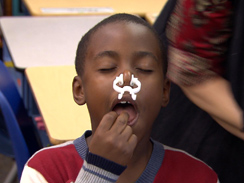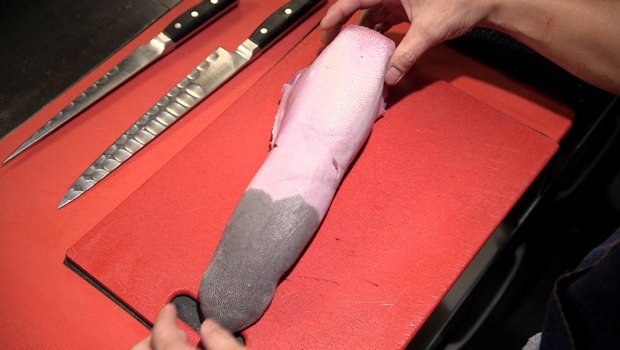Food preferences: Why we like what we like
Why do we like the foods we like? Rita Braver has conducted an informal survey:
Some third graders at Philadelphia's Frankford Friends School offered foods they really like ("I really like peaches"; "Mushrooms"; "I like a lot of different foods") and foods they really DON'T like ("Any kinds of potatoes"; "I don't like spinach-- that stuff is gross!"; "Those long green things and they look like they're sticks? I hate those!").
Have you ever wondered why we like what we like? What's the reason?
"I would say everything is an interaction of genes and environment," said Marcia Pelchat. With a doctorate in Biological Psychology, Pelchat works as a food preference expert at Monell Chemical Senses Center, a Philadelphia non-profit which studies taste and small. Her job: trying to answer the age-old question of why we do or don't desire certain dishes.
To show how genes can influence taste, she had Braver sample a clear liquid:
"This is a chemical that some people find to be bitter and others can barely taste at all," Pelchat said.
And what foods would this correlate to? "Broccoli, cabbage."
"It's very bitter to me," said Braver.
Turns out that because of our genes, about 75% of Americans taste the same bitterness Braver did. And our genes help govern another way in which we respond to food -- through our NOSES.
"We have hundreds of different smell receptor genes," said Pelchat.
- Understanding Smell: What is Olfaction? (Monell Center)
- Facts about taste and smell (Anosmia Foundation)
In fact, it's actually our sense of smell that helps us determine different flavors, as Pelchat demonstrated with the schoolchildren.
Everyone got licorice and banana jellybeans, and a nose clip. The children had to close their eyes and pick a jelly bean.
One little girl tried to identify a jelly bean with her nose closed. "Banana?"
Then the nose clip was taken off. "Eeuw, it's licorice. Eeuw, eeuw, eeuw!"
Those who study food preference say that more than anything, even genetics, our favorite foods are determined by what we've been exposed to -- and our memories:
Jalea said she loves ribs and broccoli, "because the way my dad makes the ribs, it just tastes super, super good, and when my mom makes broccoli it tastes so good and I love it."
On the other hand, lack of familiarity with food can breed contempt. Dashiell had never tried liver -- and doesn't want to.
But liver -- even RAW liver -- is on the menu at Takashi, a Japanese-Korean fusion restaurant in lower Manhattan, where the focus is on beef delicacies like tongue, beef tendon stew, and cow testicles.
Believe it or not, folks line up to get in.
Marcia Pelchat describes those who go for the exotic as adventure eaters -- people who may have overcome both their genetic predispositions and the fact that they've never been exposed to a food.
And yes, for most of us, our willingness to experiment does increase with age: "It's certainly normal for kids to be a little hesitant to try new things," said Pelchat. "Adults realize it's not going to kill them."
So that's how our faithful correspondent found herself tasting one of Chef Takashi's specialties, one he grew up eating in his home town of Osaka, Japan: Large intestine.
"This is my favorite cut," he told Braver. "It's almost like tasty bacon."
"I think I'm not gonna like it," she said.
But after a few minutes of grilling in the Chef's special sauce: "Okay, it's very chewy," said Braver. "I think the secret is the sauce."
In the end, we do have the ability to change what we like to eat. As with so much in life, it's a question of mind over matter.
- Recipe index: "Sunday Morning"'s 2015 "Food Issue" - Delicious menu suggestions from top chefs and the editors of Bon Appetit magazine
For more info:
- Marcia Pelchat, Monell Chemical Senses Center, Philadelphia
- Frankford Friends School, Philadelphia
- Takashi, New York City
- Brookfield Place, New York City

